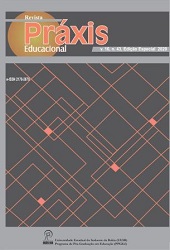FENOMENOLOGIA E O DESENVOLVIMENTO DE UM ESTILO DE GESTÃO INOVADORA DO LYCEUM EDUCACIONAL
DOI:
https://doi.org/10.22481/rpe.v16i43.6841Palavras-chave:
Lyceum educacional , Estilo de gestão da inovação , Modelo de aprendizagem para gestão inovadora do lyceumResumo
O objetivo deste artigo é apresentar as características, o conteúdo e a lógica do desenvolvimento de um estilo de gerenciamento inovador entre os diretores de lyceums educacionais da Rússia moderna. O estudo revela as características específicas desse estilo de gestão, que se resumem à capacidade do gerente de promover o espaço educacional do lyceum para o estado de um sistema em desenvolvimento dinâmico que atende aos requisitos modernos de treinamento de especialistas uma economia inovadora. Um critério-chave para um estilo de gerenciamento inovador foi a capacidade do gerente de dar uma contribuição pessoal à promoção da inovação. Esse critério tornou possível identificar os níveis de crescimento do estilo inovador de gerenciar o lyceum (reprodutivo, adaptável, modelagem local, modelagem de sistema, inovação inovadora). Um modelo de atividade gerencial inovadora foi desenvolvido para o chefes do lyceums, que apunta a la formación de un potencial de liderazgo constructivo y un dinámico "auto-concepto" de gestión. É revelada a lógica da formação de um estilo de gestão inovador, que consiste em três estágios: reflexivo, identificação e o estágio da autorrealização profissional. Como resultado da aplicação dessa lógica, os gerentes do grupo experimental desenvolveram melhor tolerância e flexibilidade da posição, aumentaram sua criatividade e capacidade de suportar estresse prolongado, melhor controlaram a situação e a comunicação, tomaram as decisões necessárias mais rapidamente, mostraram autoconfiança e capacidade de exercer influência gerencial e pedagógica, seja responsável.
Downloads
Referências
DERKACH, A.A. (2004). Akmeologic basis of development of professionalism. Moscow-Voronezh. 750 p.
DIMMOCK, C. (Ed.) (1993). School-based management and school effectiveness. Abingdon: Routledge.
DIESTERWEG, A. (1956). Selected pedagogical essays. Moscow: Uchpedgiz. 374 p.
DRUCKER, P. (2007). Innovation and Entrepreneurship: Practice and Principles. Butterworth-Heinemann.
GUILE, D. & GRIFFITHS, T. (2001). Learning through work experience. Journal of Education and Work, 14(1), 113–131.
FAYOL, H. (1949). General and Industrial Management. Translated by C. Storrs, Sir Isaac Pitman & Sons, London.
HOFFMAN, A. & SPANGEHL, S. (Eds). (2011). Innovation in Higher Education: Igniting the Spark for Success. American Council on Education, Rowman & Little field Publishers Inc., Lanham, MD.
IACOCCA, L. & WHITNEY, C. (2008). Where Have All the Leaders Gone? New York/ London/ Toronto/ Sydney: Scribner.
JERSILD, A.T. (1955). When teachers face themselves. Oxford, England: Bureau of Publications, Teachers Co.
KLIMOV, E.A. (1998). Introduction to the psychology of labor: Introduction to the psychology of labor: a textbook for high schools. Moscow: Culture and Sports: UNITI. 343p.
LAMBERT, L., WALKER, D., ZIMMERMAN, D. P., COOPER, J. E., LAMBERT, M. D., GARDNER, M. E., & SZABO, M. (2002). The constructivist leader (2nd ed.). New York: Teachers College, Columbia University.
LEWIN, K., LIPPIT, R. & WHITE, R.K. (1939). Patterns of aggressive behavior in experimentally created social climates. Journal of Social Psychology, 10, 271-301.
MASLOW, A. (1987). Motivation and Personality. N.Y: Addison-Wesley.
MESCON, M.H., ALBERT, M. & KHEDOURI, F. (1985). Management. New York: Harper and Row, Publishers.
PODYMOV, N.A. (1998). Psychological barriers in teaching. Moscow: Prometheus, 239 p.
PONOMAREV, Ya.A. (1976). Creativity psychology and pedagogy. Moscow: Pedagogy. 280 p.
ROGERS, C.R. (1961). On becoming a person. Boston, MA: Houghton Mifflin.
ROMANOVA, G. (2020). The Readiness of Leading and Teaching Staff to Develop Students’ Sociocultural Competence in the Inclusive Learning Environment. Pedagogika, 138(2), 226–243. https://doi.org/10.15823/p.2020.138.13
ROMANOVA, G. A., ANANISHNEV, V. M. & DARDA, E. S. (2020). Inclusive education: A path to equal rights. Opcion, 36 (Special Edition 26), 613-628.
RYZHKOVA, I.V. & SERGEEV, A.M. (2010). Specific Features of internationalization of higher education in the framework of the northern dimension. Baltic Region, 3, 24-37.
SALAZAR, P. (2013). High-impact leadership for high- impact school: The actions that matter most. New York, NY: Routledge.
SERDYUKOV, P. (2017). Innovation in education: what works, what doesn’t, and what to do about it? Journal of Research in Innovative Teaching & Learning, 10 (1), 4-33. https://doi.org/10.1108/JRIT-10-2016-0007
SHOSTROM, E.L. (1974). Manual for the Personal Orientation Inventory. San Diego, California: EdITS/Educational and Industrial Testing Service.
SHUTENKO, A.I., SHUTENKO, E.N., SERGEEV, A.M., RYZHKOVA, I.V., KORENEVA, A.V. & TEGALEVA, T.D. (2018). Socio-cultural Dominants of Higher School Innovation Mission. Espacios, 39(52), 34. https://www.revistaespacios.com/a18v39n52/18395234.html
SHUTENKO, E.N. (2015). Motivational and Conceptual Aspects of Student Self-fulfillment in University Education. Procedia – Social and Behavioral Sciences, 214(5), 325-331. http://www.sciencedirect.com/science/article/pii/S1877042815060073.
SHUTENKO, E.N. & SHUTENKO, A.I. (2015). Socio-Сultural Trends in the Development of the Higher School's Innovative Potential. Procedia – Social and Behavioral Sciences. 214(5), 332-337. http://www.sciencedirect.com/science/article/pii/S1877042815060103
SHUTENKO, A.I, SHUTENKO, E.N, SERGEEV, A.M., RYZHKOVA, I.V., TALYSHEVA, I.A. & TSAREVA, E.V. (2018). The use of modern ICT to provide students' self-realization in Russian higher school. Espacios, 39(43), 15. http://www.revistaespacios.com/a18v39n43/18394315.html
SLASTENIN, V.А. & PODYMOVA, L.S. (1997). Pedagogy: innovative activity. Moscow: Magister. 224 p.
STOGDILL, R. M. (1974). Handbook of leadership: A survey of the literature. New York: Free Press.
Downloads
Publicado
Como Citar
Edição
Seção
Licença
Copyright (c) 2020 Práxis Educacional

Este trabalho está licenciado sob uma licença Creative Commons Attribution-ShareAlike 4.0 International License.
Você é livre para:
Compartilhar - copia e redistribui o material em qualquer meio ou formato; Adapte - remixe, transforme e construa a partir do material para qualquer propósito, mesmo comercialmente. Esta licença é aceitável para Obras Culturais Livres. O licenciante não pode revogar essas liberdades, desde que você siga os termos da licença.
Sob os seguintes termos:
Atribuição - você deve dar o crédito apropriado, fornecer um link para a licença e indicar se alguma alteração foi feita. Você pode fazer isso de qualquer maneira razoável, mas não de uma forma que sugira que você ou seu uso seja aprovado pelo licenciante.
Não há restrições adicionais - Você não pode aplicar termos legais ou medidas tecnológicas que restrinjam legalmente outros para fazer qualquer uso permitido pela licença.












